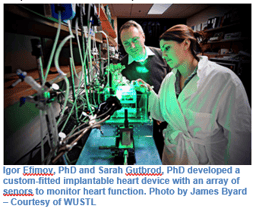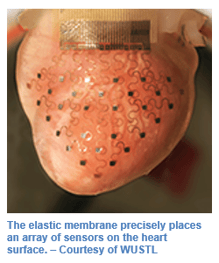For patients with heart rhythm disorders, current pacemakers and implantable cardioverter defibrillators are “one-size-fits- all” devices that provide narrowly limited information for cardiologists treating patients with the devices.
 Using 3D printing, researchers at Washington University are developing more precise heart sensors that might lead to tailored treatment for heart conditions like atrial fibrillation.
Using 3D printing, researchers at Washington University are developing more precise heart sensors that might lead to tailored treatment for heart conditions like atrial fibrillation.
In their approach the researchers use 3D printing to produce an implantable device with embedded sensors that can detect multiple measures of heart function including temperature, mechanical strain, pH, or deliver a pulse of electricity in the case of arrhythmia.
The idea is to provide cardiologists a more complete picture of a patient’s heart that could be used to tailor treatment of rhythm diseases of the ventricles or the lower chambers of the heart and possibly predict an impending heart attack before a patient exhibits any physical signs.
 The team of bioengineers led by Igor Efimov, PhD at the School of Engineering & Applied Science at Washington University in St. Louis, created an elastic membrane made of a soft, flexible silicon material that is precisely shaped to match the patient’s epicardium, or outer layer of the heart wall. The team then prints an array of tiny sensors onto the membrane fitted to a precise model of the patient’s heart 3D printed from a MRI or CT scan.
The team of bioengineers led by Igor Efimov, PhD at the School of Engineering & Applied Science at Washington University in St. Louis, created an elastic membrane made of a soft, flexible silicon material that is precisely shaped to match the patient’s epicardium, or outer layer of the heart wall. The team then prints an array of tiny sensors onto the membrane fitted to a precise model of the patient’s heart 3D printed from a MRI or CT scan.
Efimov explained in an interview in the University’s science and technology publication, Source that current medical devices that treat heart rhythm diseases are essentially based on two electrodes inserted into the heart chambers through veins.
“Contact with the tissue is only at one or two points, and it is at a very low resolution, Efimov told the Source writer. “What we want to create is an approach that will allow you to have numerous points of contact and to correct the problem with high-definition diagnostics and high-definition therapy.”
Because the device is implantable, it will allow physicians to monitor vital functions over time and could continuously monitor troponin, a protein produced in heart cells that signals an impending heart attack. Efimov says the membrane ultimately will be combined with ventricular assist devices.
While his focus is the heart, Effimov says that the device could also be applied to other organs to stimulate brain functions or kidneys.
Kapstone Medical is a full-service product realization firm that partners with inventors and manufacturers of all sizes to rapidly develop and commercialize new medical devices or processes. We love sharing the latest news in 3D printing and what’s going on in the MedTech Industry.
Visit our website or Call Us Today to learn more! Phone: 704-843-7852 – email: info@kapstonemedical.com
Source: The Source the science and technology publication of Washington University.



